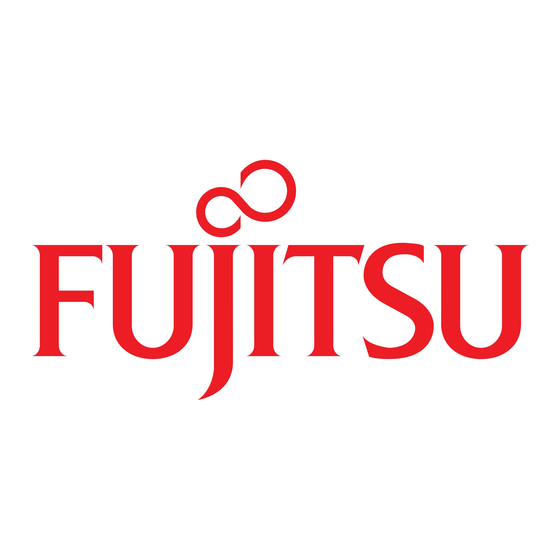- ページ 24
スキャナー Fujitsu Fujitsu fi-5950のPDF はじめにをオンラインで閲覧またはダウンロードできます。Fujitsu Fujitsu fi-5950 27 ページ。 Image scanner
Fujitsu Fujitsu fi-5950 にも: パンフレット&スペック (4 ページ), 消耗品の交換とクリーニング (24 ページ), はじめに (11 ページ)

Appendix 2
During its operation, the inside
AUTION
glass of the ADF becomes very hot.
Before you clean inside the scan-
ner, turn off its power and unplug
the AC adapter from the outlet. Wait
for at least 15 minutes.
Do not turn off the scanner when
you clean the Feed rollers or Eject
rollers.
■ Cleaning Materials
Cleaning
Parts No.
Materials
Cleaning sheet
CA99501-
0016
Cleaner F1
PA03950-
0352
Cleaning wipe
PA03950-
0419
Cotton swab
Commercially available
Lint-free dry
cloth
*1: For details about the cleaning materials, contact the
FUJITSU scanner dealer where you purchased the
scanner.
*2: Pre-moistened with Cleaner F1, Cleaning Wipes are
used instead of moistened cloths.
■ Cleaning Method
The ADF and the Feed rollers must be cleaned with a
lint-free cloth moistened with the Cleaner F1.
DAILY CARE
Remarks
20 sheets/pack
For the cleaning method,
refer to "4 DAIRY
CARE in the fi-5950
Operator's Guide.
1 bottle
Moisten a cloth with this
fluid and wipe the scan-
ner to clean.
24 sheets per pack
(*1)(*2)
ATTENTION
■ Locations and Cycle for Cleaning
Part to clean
Pad
Pick rollers
Brake roller
Separator rollers
Feed rollers
Pinch rollers
Transport path
Glass
Skew-detection sensor
Document sensor
ATTENTION
For details on the cleaning the ADF, refer to "4.DAILY
CARE" in the fi-5950 Operator's Guide on the Setup
DVD-ROM".
AP-4
It may take long before the cleaner
vaporizes if a large quantity is used.
When cleaning the scanner parts,
dampen a cloth with modest quantities
of the cleaner. In addition, wipe off the
cleaner completely with a soft lint-free
cloth to leave no residue on the surface
of the cleaned parts.
Standard Cleaning Cycle
Clean these parts after every
10,000 scans.
The scanner must be cleaned more fre-
quently if you scan any of the following
type of sheets:
•
Documents of coated paper
•
Documents that are almost completely
covered with printed text or graphics
•
Chemically treated documents such
as carbonless paper
•
Documents containing a large amount
of calcium carbonate
•
Documents written with pencil
•
Documents on which the toner is not
sufficiently fused
